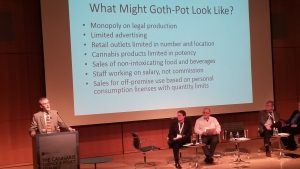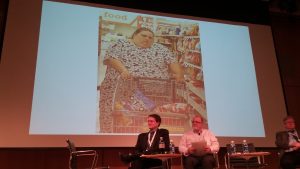
This is the conclusion of a five-part post to tide you over for the Independence Day weekend. Enjoy Part I, where I explain Prof. Mark Kleiman’s fear of low legal marijuana price, Part II where I debunk his fear of “cannabis use disorder”, Part III where I show you Kleiman’s vision of an ideal cannabis policy, and Part IV where I show Kleiman’s fear of increased marijuana use to be unfounded. – “R”R
It’s a wonder anyone consults with Mark Kleiman on marijuana policy. In 2010, as California was fixing to vote on Prop 19, he told the LA Times that, “There’s one problem with legalizing, taxing and regulating cannabis at the state level: It can’t be done… any grower or seller… would be confessing, in writing, to multiple federal crimes. And that won’t happen.”
Two years after saying that state-legal pot producers and sellers wouldn’t risk federal conspiracies, Kleiman and his company BOTEC were accepting a contract from Washington State taxpayers to consult on how to construct their state-legal system of pot producers and sellers risking federal conspiracies.
There in Washington Kleiman’s Soviet-style central economic planning led to chaos. Kleiman’s BOTEC recommended a state-limited production canopy and a limit on statewide retail outlets. The result was prices in Washington that were initially around $30 per gram and kept a flourishing black market so emboldened that dealers would sit in the legal pot shop parking lots and poach customers who wished to avoid the high taxes.

Now Washington State has enacted Senate Bill 5052, further elaborating on BOTEC’s policy prescriptions by shutting down the medical marijuana market and folding it into the recreational system. Thus, a city like Tacoma that had 70 outlets serving its marijuana market is now mandated to only have 16 outlets. So just as market forces had finally brought Washington’s weed price to under $10 a gram, Washington is going to restrict supply and raise those prices in the legal market while returning many medical marijuana patients to the black market.
“If someone wanted to write a law to increase the prevalence of [cannabis use disorder], it would look a lot like the Adult Use of Marijuana Act,” Kleiman predicts. “That leaves the voters with a choice between the existing unworkable quasi-legalization in the form of a corrupt ‘medical marijuana’ system and a formal legalization designed to make the drug problem worse. I’m glad I left.”
And if someone wanted to write a law to protect the black market, if would look a lot like the Washington law BOTEC helped craft, with no allowance for home growing, artificially restricted production and distribution, and the nation’s highest marijuana taxes.

I believe that many of the cannabis consumers in Washington State are wishing Kleiman had left them alone. And you can bet that once California passes legalization, Kleiman, formerly a professor at UCLA, will be lining BOTEC up to apply for lucrative consultation contracts in the Golden State, arguing for ways to ensure cannabis consumers don’t get “wrecked out of their gourds” on cheap marijuana.
Don’t buy Kleiman’s rent-seeking hype. The benefits of cheap marijuana – including fewer illegal dealers, overdoses, suicides, and crashes – are worth the tiny minority of tokers who will end up smoking too much weed. Plus, they’ll save enough money on their habit they can better afford to self-admit to rehab, which will be less stigmatized and potentially funded by marijuana taxes. The only thing a free market in legal marijuana is a danger to is the consulting business of public policy wonks.






